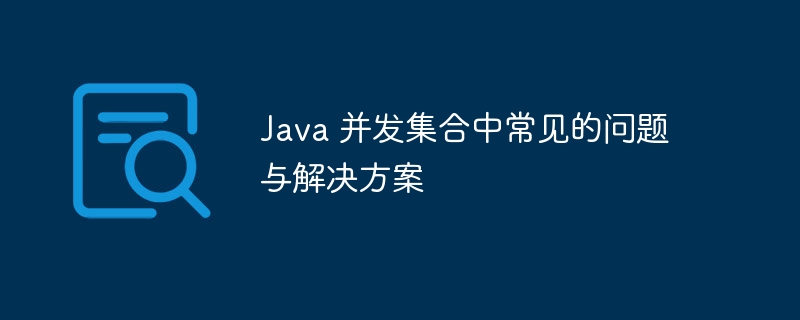Home >Java >javaTutorial >Common problems and solutions in Java concurrent collections
Common problems and solutions in Java concurrent collections
- WBOYforward
- 2024-02-20 12:10:071000browse

1. CollectionModify exception
Java concurrent collection is a commonly used tool when writing multi-threaded applications, but you may encounter some problems during use. PHP editor Strawberry has compiled common problems and solutions in Java concurrent collections for you. This article will delve into how to correctly use Java concurrent collections to improve program performance and stability in a multi-threaded environment. By studying this article, you will master methods to solve common problems in Java concurrent collections, providing guidance and help for your multi-threaded application development.
solution:
- Use Concurrency Collections: Java provides a variety of concurrent collections, such as
Concurrent<strong class="keylink">HashMap</strong>,CopyOnWriteArrayList, etc. These collections can guarantee Iterate safely in a multi-threaded environment. - Use iterators: In a single-threaded environment, you can use iterators to traverse the collection. The iterator takes a snapshot of the collection on each iteration, so it is not affected by collection modifications.
2. Thread safety issues
Thread safety issues refer to the fact that in a multi-threaded environment, when the same object is accessed concurrently, the state of the object is inconsistent. This situation usually occurs when a collection is modified, and multiple threads modify the same collection at the same time, causing the contents of the collection to be incorrect.
solution:
- Use concurrent collections: Java provides a variety of concurrent collections, such as
ConcurrentHashMap,CopyOnWriteArrayList, etc. These collections can ensure safe modification in a multi-threaded environment. - Using Locks: In a single-threaded environment, you can use locks to protect collections. When a thread needs to modify a collection, it needs to acquire the lock before it can modify the collection.
3. Performance issues
In high concurrency environments, the performance of concurrent collections may become a bottleneck. This situation usually occurs when frequent read and write operations are performed on the collection. Since concurrent collections require locking for each operation, performance will decrease.
solution:
- Use lock-free concurrent collections: Java provides a variety of lock-free concurrent collections, such as
ConcurrentSkipListMap,ConcurrentLinkedQueue, etc. These collections can avoid locking operations and thus improve performance. - Reduce the granularity of locks: In some cases, performance can be improved by reducing the granularity of locks. For example, you can split a large collection into multiple smaller collections and then use separate locks for each small collection.
4. Serialization problem
In some cases, concurrent collections need to be serialized for transmission or storage. This situation usually occurs in distributed systems when concurrent collections need to be shared between different machines.
solution:
- Use serializable concurrent collections: Java provides a variety of serializable concurrent collections, such as
ConcurrentHashMap,CopyOnWriteArrayList, etc. These collections can be serialized safely. - Use custom serializer: For some concurrent collections that do not support serialization, you can write a custom serializer to achieve serialization.
The above is the detailed content of Common problems and solutions in Java concurrent collections. For more information, please follow other related articles on the PHP Chinese website!

